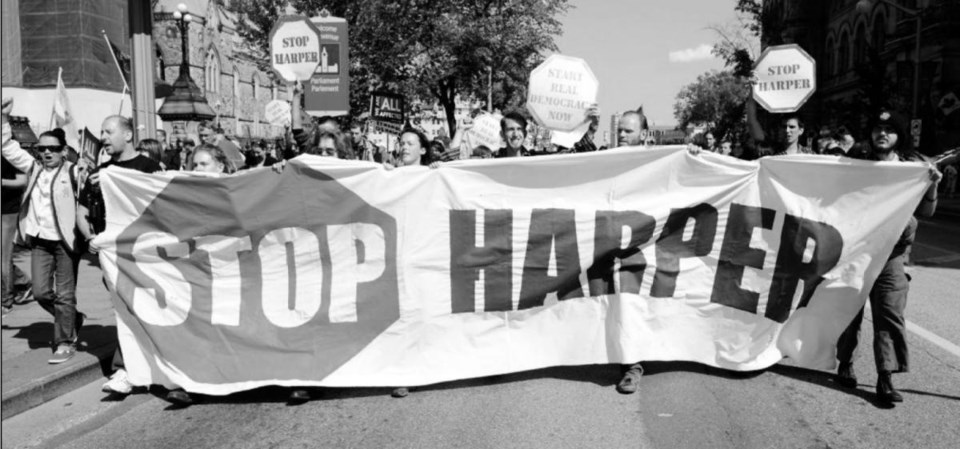It has been said that "political information is to democratic politics what money is to economics; it is the currency of citizenship."
If so, there are growing signs that Canada may be experiencing a democratic recession. And, as in most economic recessions, the effects are being felt disproportionately by young people, especially those with lower levels of education.
What is the evidence for this?
First, it is well known that fewer and fewer Canadians are taking the time to perform that most basic of democratic actions - voting. Federal, provincial and municipal elections have all seen record-low turnouts in recent years (the recent closely fought Quebec election notwithstanding).
At the federal level, turnout has been declining steadily since the 1990s, reaching an all-time low in the 2008 election, before rebounding slightly in 2011. But at 61 per cent, Canada's turnout rate is still trailing well behind that of most other established democracies, as well as our own historical average of 75 per cent.
The long-term decline in voter turnout is not evenly distributed across the population, but follows a clear generational divide. Today's young electors are voting less - a lot less - than their parents or grandparents did at the same age. In 1965, about two-thirds of first-time electors voted in their first election. By 1984, that number had fallen to one-half, and by 2004, barely one-third of firsttime electors voted.
At the same time, what researchers refer to as the "life-cycle effect" is weakening, meaning that today's young electors are much more likely to remain habitual non-voters as they age.
Together, these two demographic trends are the driving force behind the longterm voter decline in this country.
And it is not the case that young people are simply opting out of voting and other traditional forms of participation in favour of less conventional activities.
The numbers of young Canadians who actually participate through non-traditional means - for example, joining a protest or boycott, signing a petition, or blogging about a political issue - tend to be fewer than the numbers who vote. And those who do participate in other ways also tend to vote.
So while there is a core of young Canadians who are politically engaged and who participate in multiple ways, a growing number are simply disengaged. They are, in the words of political scientist Paul Howe, "citizens adrift."
Research has long shown that the driving force behind political engagement and participation is political knowledge. Multiple studies have shown that the more informed people are about politics, the more likely they are to participate. Elections Canada's National Youth Survey, conducted after the May 2011 federal election, found that political knowledge was one of the three most important factors influencing whether a young person voted in that election (the other two were political interest, and electoral-process knowledge).
Political knowledge and information are essential for ensuring that citizens can hold their elected representatives accountable for their actions. In this sense, they lie at the heart of our democratic system of government.
So how do we build political knowledge, and with it greater civic engagement? Obviously, the media play a central role, in providing information that citizens rely on to make political judgments and in holding policymakers to account. But looking beyond the media, there are three key ingredients for creating an informed and engaged citizenry:
1. Talk about politics at home. Political discussion within the family is one of the most important predictors of voting and other forms of civic engagement. Parents are key political influencers. Research shows that young people who discuss politics at home are significantly more likely to vote than those who do not.
2. Increase contacts between politicians and young people. The National Youth Survey found that young people who were directly contacted by a political party or candidate during the election were significantly more likely to vote than those who were not contacted. What's more, young people want to hear from politicians, not only during elections but on an ongoing basis, and want to make a meaningful contribution to the democratic life of their country.
3. Strengthen civic education. A minimal first step would be to ensure that every student in Canada graduates from secondary school having taken at least one mandatory civics course. But making it mandatory is not enough. To be effective, civic education must focus not only on "how a bill becomes a law," but must show students how they can participate effectively in the public life of their community and their country.
Experiential civic education is key. This includes programs such as Student Vote, which provides a parallel election experience for elementary and secondary students, as well as community service programs. Above all, educators must be supported through training and tools to do the job.
This week is Canada's Democracy Week. The goal is to help young people learn more about our democratic system and give them an opportunity to have their voices heard, particularly youth who will be voting for the first time in the next general election.
I am asking all Canadians - especially parents, educators and elected officials - to join us in celebrating and renewing our democracy by reaching out to future voters and launching them into a lifetime of civic engagement.
Marc Mayrand is the chief electoral officer of Canada, an independent officer of Parliament.



